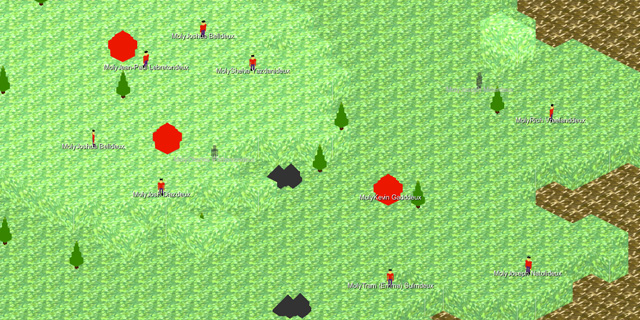
Writer Mike Walbridge’s goal: play every Molyjam game and tell you about them. Want to know more? Click here.
297: The Molydeuxds: This game represents a conglomeration of some of Molydeux’s worst ideas. There is a big, Populous-style map. I killed all of one tribe and nothing happened, and didn’t have the patience to eat the rest of them. Each character is supposed to represent a person.
The sounds were annoying, and the only thing impressive about it is that there are a lot of mechanics implemented in it for only 48 hours of programming. But none of it makes any coherent sense, except perhaps as a poorly told inside joke or for people who really, really like Populous. Sometimes simply doing something for its own sake results in nothing, not even pleasure.
296: Sadventure: “Imagine if Aeris as a ghost said you could be with her if you jump off this cliff, you do it and die, it’s game over. How would you feel?”
This is hardly a game. If you say yes, you are reunited, the end. If you say no, you look elsewhere to see game ornaments (an NES controller and a triforce are included) littering the grass.
This reminds me of that hilarious mechanic in the original Dragon Warrior, where the princess asks you if you love her. If you say no, she says “But thou must!” This will continue indefinitely until you say that yes, you do love her. To which she replies, even if you said no 57 times before: “I’m so happy!!!” This has been a running-gag since the ’80s. Taking away control is fine, but if it’s done blatantly enough the player will resent the game. We didn’t need this game to tell us this.

295: Parlance: “Was thinking about text adventure games. Imagine an adventure game set in a 3D world where all objects are made of text.”
Not sure what the point of this mechanic is either. However, it is nicely executed. Getting the key and opening the door was fun, and I am honest when I say that, though it took ten seconds. Lot of different things you could do with this, word puzzles being the most obvious choice. Could also use it in an arena in which you want to test reading comprehension or spelling, either for its own sake or to make someone feel like a scholar. Games typically only use words for storytelling or instruction on how to play, but using it as a game mechanic, not as much.
This game gives me my own Molydeuxian idea: imagine if, in Skyrim, you actually had to know the texts well? Usually the books and characters are storehouses of knowledge, but what if you were the storehouse? What if you had to become a scholar in order to pass a test or know of a culture in a way that you could the right actions or say the right things? This idea may not be publishable due to people not wanting to play games to simulate becoming an expert at something when they could you know, actually become an expert (see: arguments against playing Rock Band vs. learning actual instrument) on something real. Maybe this is only a usable idea for “gamification” crap, but at any rate, I think that there is surely a lot of potential with the use of words as objects or objective.
294: Glorious Ending Cinematic: “Game in which you create the end cinematic. Then you work your way from the start of the game to make a perfect connection into that ending.”
The technique of showing an ending or present state and then going to the past to lead up to the present is an old narrative technique, one that even games have used in the past. This time, though, you can fail to bring the narrative to its “correct” and sad, grisly ending by making the wrong choice. If you don’t choose the path to get the cinematic, you “lose.” The only option you have is to choose Fear or Love. I didn’t create the ending the first time I did it, but I guessed, correctly, that you have to choose Fear every time for the worst case scenario and got it the second time.
An obvious lesson to be sure, but perhaps you could make a subtler point with this? Perhaps this technique can get games to 19th century-lit status with its “Dear Reader” Romanticism and its easy and obvious morals, beautifully illustrated? Not sure this exact method will catch on as players like to have choice when the narrative is so key, and when they don’t they don’t want to be penalized for anything other than death through failure to skillfully implement violence. On second thought, maybe “Glorious Ending Cinematic” is only interesting and can’t truly get us anywhere or teach us anything other than limitation, when what Molydeuxians are looking for is possibility.
292: Mercutio: “Would love to make a platformer where you play as a thing with a microwave for a head. You have to grab enemies, put them in your head. Etc”
This didn’t get quite off the ground. You can tell from the comments on the banners at the beginning and end of the level. This tweet didn’t seem worthy of doing anything with anyway. New and amusing platform mechanics have been and are being explored quite thoroughly since the 80s and through downloadable and indie titles today. The idea was self-explanatory enough that a player will not benefit from a demonstration. The pitch was sufficient enough.
For more Molyjam games, check out Mike’s blog.



















